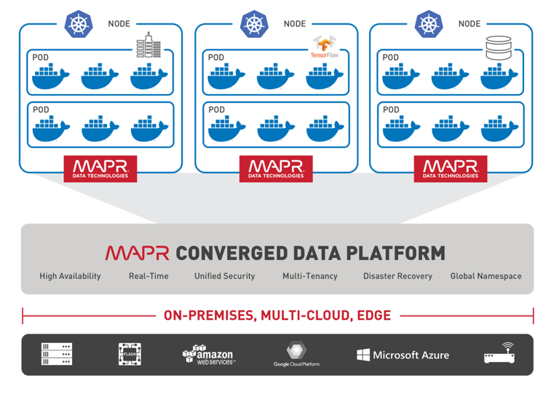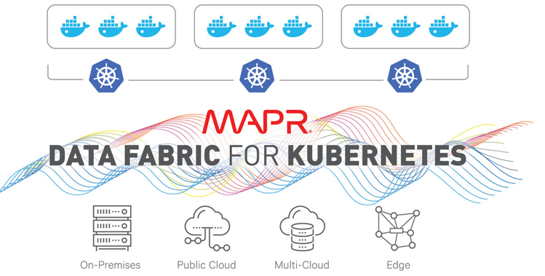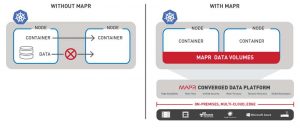MapR Data Fabric for Kubernetes Enables Deployment of Stateful Applications Across Clouds
Provides persistent storage for containers and enables deployment of stateful containerized applications.
This is a Press Release edited by StorageNewsletter.com on March 16, 2018 at 2:26 pmMapR Technologies, Inc. announced at Strata Data Conference it has extended advanced containers integration into the Converged Data Platform which provides persistent storage for containers and enables the deployment of stateful containerized applications.
The Data Fabric for Kubernetes addresses the limitations of container use by providing easy and full data access from within and across clouds and on-premises deployments. Now stateful applications can easily be deployed in containers for production use cases, machine learning pipelines and multi-tenant use cases.

The company’s Data Fabric includes a natively integrated Kubernetes volume driver to provide persistent storage volumes for access to any data – from databases, files and streaming – located on-premises, across clouds and to the edge. The data fabric’s extension to Kubernetes also provides scheduled automation for multi-tenant, containerized and non-containerized applications located inside and outside of a MapR cluster.
“Stateful and data-driven applications can’t elegantly live in the cloud without an elegant means for persisting state and making it available, securely and robustly, to containerized microservices,” said James Kobielus, lead analyst, SiliconANGLE Media, Inc. “Container technology has traditionally failed to address the data portability challenge. Ideally, developers should be able to build containerized applications that can directly access persisted data volumes of any scale. Likewise, data architectures and operations personnel should be able to ensure that this data remains available to containerized apps regardless of the platforms to which those containers have been moved. We’re impressed with how MapR has addressed these challenges for stateful containers that run in big-data clusters that have deployed Kubernetes.“
Using the Data Fabric for Kubernetes, organizations can enable a global, flexible data fabric that provides high performance access to data as if it were local and can benefit from enterprise security protection, container HA, snapshots, mirroring and DR.
“MapR provides the flexibility, elasticity and simplicity for next-gen application deployment eliminating concerns about how, where and if the underlying platform can grow with your data and business needs,” said Anil Gadre, chief product officer, MapR. “We provide a unique advantage for our customers by enabling them to build a Data Fabric that extends to disparate environments, where they can capture, store, process and analyze any type of data. Extending the Data Fabric to Kubernetes is a needed advancement to accelerate the deployment of containerized applications in enterprises while allowing them to harness value from their data. This is a game changer in many deployments.“
Click to enlarge
New container extension also brings cloud capabilities to data fabric, including:
-
Differentiated data services within a cloud through data synchronization and integrity across availability zones to meet HA requirements.
-
Cross-cloud data bursting to support cloud neutral deployments with the ability to optimize application processing for cost, performance, and compliance. Cross data access support includes NFS, S3, HDFS, ODBC.
-
Supports on-ramp from on-premises and private cloud deployments to public cloud.
The MapR Data Fabric for Kubernetes is available.
















 Subscribe to our free daily newsletter
Subscribe to our free daily newsletter

